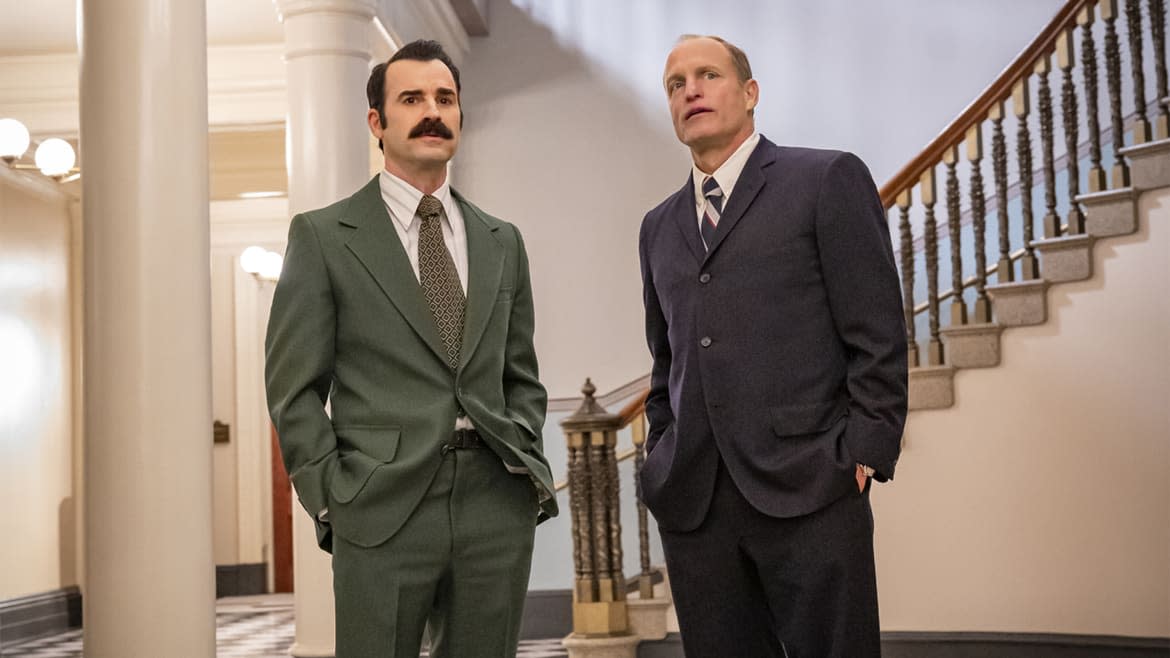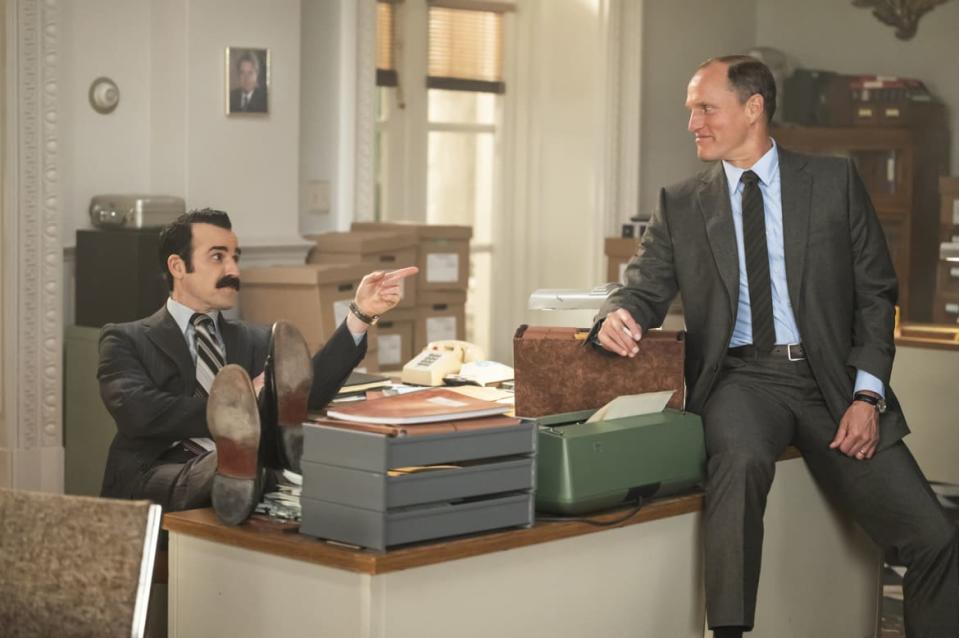‘White House Plumbers’ Looks for the Laughs in Watergate

- Oops!Something went wrong.Please try again later.
- Oops!Something went wrong.Please try again later.
- Oops!Something went wrong.Please try again later.
- Oops!Something went wrong.Please try again later.
If you, like me, are not much of a history buff, you might recall the distinct confusion you felt upon realizing that the Watergate break-ins did not take place at some high-level government building, with even higher security. Knowing that the scandal was key to the eventual downfall of Richard Nixon’s presidency, I spent most of my adolescence assuming that the Watergate was a building in Washington, D.C., akin to the Kremlin. A hybrid office-hotel-apartment-complex was not on my impeachment bingo card. Hell, I knew teenagers who could pull off that job with more discretion, armed with nothing but a Swiss Army knife and two packs of sugar-free gum.
For all of the television shows and movies that have been made about the Watergate scandal, there’s been surprisingly little attention to the burglars themselves. (Unless you count an integral part in 1999’s Dick, which really made All the President’s Men quake in its boots). Their story has largely been skimmed over, in favor of retellings of the political fallout. Watergate is a fascinating scandal, but it can only be told in so many ways.
Enter HBO’s White House Plumbers (premiering May 1), which finally feels like a novel take on a dusty story, despite the limited series sitting in production hell since late 2019. This five-episode retelling of the Watergate scandal blessedly cascades down the chain of command, all the way to the team of burglars. Specifically, their two oafish leaders, G. Gordon Liddy (Justin Theroux) and Howard Hunt (Woody Harrelson), whose blind patriotism was ultimately key to their downfall.
While just last year there was another prestige series about Watergate, Gaslit, White House Plumbers doesn’t feel pointless. The show’s ensemble cast is electric, and there’s a surprising amount of visual style to boot. Theroux and Harrelson are both stellar, but it’s the show’s delicate depiction of their characters’ real-life buffoonery that will jolt and delight both history-class dropouts and Watergate buffs alike.
‘Dead Ringers’ Dares Us to Pity the Rich in One Chilling Monologue
Liddy and Hunt, who were both former intelligence agents before they became low-level Nixon stooges—Liddy for the FBI, and Hunt for the CIA—were undyingly devoted to conservative American politics. In 1972, both men were called upon by Nixon’s Committee to Re-Elect the President, and asked to brainstorm intelligence-gathering operations. Eventually, they landed on a package of wild, highly illegal ideas that Liddy referred to as Operation Gemstone.

Justin Theroux and Woody Harrelson.
Harrelson and Theroux play off each other with dynamo chemistry in the series’ initial episodes. Liddy spends his days trying to rile Hunt up, while Hunt is desperate to keep things realistic and scaled-down, lest he is forced to let go of his post and return to his day job as an author of mystery novels. This proves harder than expected, as Liddy’s penchant for Nazi memorabilia, inflated ego (with an even more inflated mustache), and bombastic ideas aren’t exactly inconspicuous.
For all of Liddy’s real-life awfulness, he’s played by Theroux with the perfect balance of smarm and charm. Theroux is, simply, just great casting, threatening to steal every scene he’s in away from Harrelson, with his low, lilting transatlantic accent and foolishly swollen confidence. Harrelson, however, does provide the necessary grounding point, keeping White House Plumbers from feeling too much like a satirization of history. The show is at its best, however, when it leans into the comedy of its own characters’ existences, and all of the trash fires happening in the Nixon administration around them.
One particular instance is Kathleen Turner’s guest appearance in the second episode as Dita Beard. Beard was a lobbyist for International Telephone and Telegraph Corp., whose memo pledging $400,000 to the Republican National Convention—if the Department of Justice settled a case against ITT—caused its own mini-scandal. Turner is a genius bit player, choking on her cigarette in an ITT office while she screams to typists outside, asking if “commitment” has “one T or two.” To save their asses from coming under the microscope, Liddy visits Dita under the cover of night, in a black bob wig and prosthetic nose, where Dita then spouts some nonsense about White House officials thinking she’s engaged in some “lesbo-homo plot” against the president. It’s so blissfully absurd, and such a great model to point to when trying to make a political parody that still has genuine narrative merit.

Not everything in White House Plumbers is quite so adroit. The series may only be five episodes, but there are occasional moments of narrative dip. Viewers will always be more tuned in to the splashy moments, like the bumbling break-in attempts (of which there were four, each well-documented by the show). A little too much focus is spent on Hunt and Liddy’s family lives, which often skate the same territory for multiple episodes. But with Judy Greer and Lena Headey rounding out the ensemble as Liddy and Hunt’s wives, Frances and Dorothy, it’s hard to be too upset when both actresses are given outstanding scenes of their own.
Elizabeth Olsen vs. Jessica Biel: Who’s the Better Candy Montgomery?
Ultimately, those domestic stakes are necessary, particularly in its final two episodes, which turn up the emotional dial for a look at the severity of the shit puddle Liddy and Hunt allowed themselves to be submerged in. Both men are facing jail time, the dissolution of their families, and the fury of Nixon’s soulless lackeys. Having spent the first half of the season exploring the similarities between Hunt and Liddy, White House Plumbers spends its back half highlighting their differences. It doesn’t ask for our sympathy, but, rather, poses questions of integrity that all (good) Watergate-related media should.
White House Plumbers may end up asking the same questions that have been raised for decades, but it does so in smart, snappy ways. The series juggles different genres in an attempt to surface something new from old material. And it does so by examining how infallible loyalty to politics and country has always been a uniquely ghastly form of religion, one that hasn’t come close to dying out—even 51 years later.
Liked this review? Sign up to get our weekly See Skip newsletter every Tuesday and find out what new shows and movies are worth watching, and which aren’t.
Get the Daily Beast's biggest scoops and scandals delivered right to your inbox. Sign up now.
Stay informed and gain unlimited access to the Daily Beast's unmatched reporting. Subscribe now.

